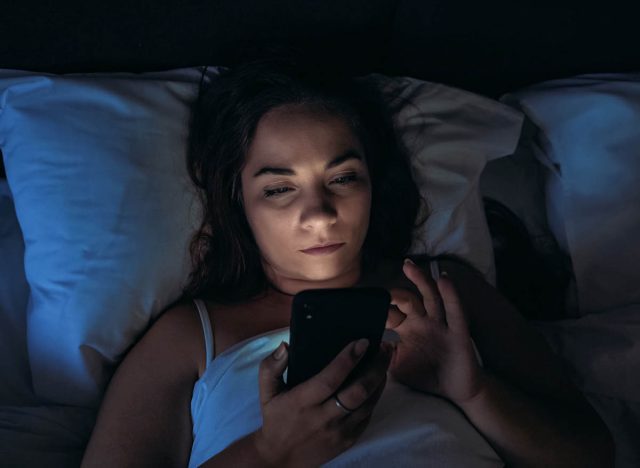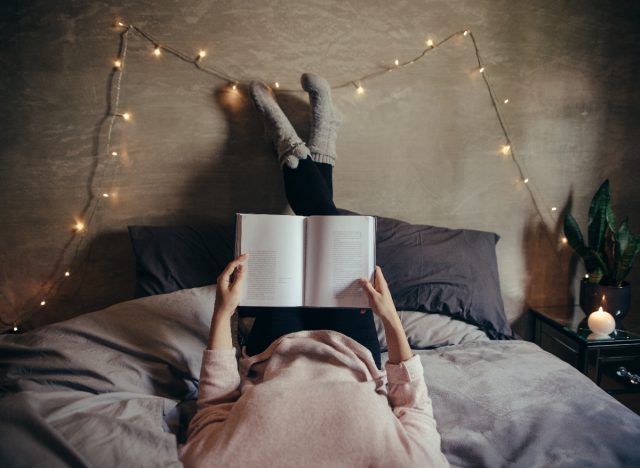If you have difficulties sleeping, know that you have plenty of company. In fact, according to the American Sleep Association, there are 50 to 70 million people in the country who experience issues catching some Zs. If you’re up “clock watching” at night, you’re aware there are some pretty ugly side effects, and we are here to address them.
The most typical type of sleep disorder is insomnia. Being really tired and unable to sleep is totally frustrating. So we spoke with Colin Espie, Ph.D., Co-Founder and Chief Scientist of Big Health and Professor of Sleep Medicine at the University of Oxford to get a better understanding of the ugly side effects of not sleeping, along with what you can do to relieve the cycle.
Read on to learn more about the ugly side effects of not sleeping, and next, be sure to check out The 6 Best Exercises for Strong and Toned Arms in 2022, Trainer Says.


Dr. Espie explains that sleeping poorly just by itself can put you at risk for developing illness in the future. It can also have a negative impact on existing health conditions. Everyone at one time or another experiences restricted or poor-quality sleep, making it easy to understand how not getting a good night’s rest can create havoc on an individual’s ability to function the next day.
“The most common effects we experience when we have poor sleep are fatigue and sleepiness,” Dr. Espie tells us. “You may also find yourself ‘snapping’ at a friend or colleague, or becoming easily irritated after a poor night of sleep. Both increased sleepiness and fatigue are associated with the inability to concentrate or ‘think clearly.’ If someone is excessively sleepy and struggling to remain awake during the day, for reasons that they cannot explain, they should speak to their doctor.”
Related: Why You’re Not Sleeping Anymore As You Get Older, Expert Says


Studies prove that alterations to sleep quality affect both the mind and body. In fact, research has shown that disturbance in sleep can exacerbate other health conditions, including chronic pain disorders, psychiatric/psychological disorders, diabetes, and obesity. Individuals who already have an issue with insomnia even have twice the risk of developing depression, Dr. Espie says.
Related: 10 Ultra-Effective Sleep Hacks For A Better Night’s Rest


Let’s start with the potential reasons that may be preventing you from sleeping at bedtime. The very thought of why you’re not sleeping can keep you up at night. Worrying can create feelings of despair and concerns about rallying to get through the next day. Dr. Espie explains, “Other contributing factors to poor night’s rest include lifestyle habits, such as consuming nicotine or caffeine late in the day or large amounts, experiencing stress, or exposure to bright light or blue light by using your smartphone or watching television before bed, or even frequent daytime naps.”
READ RELATED: Watch Black Chully Twitter Viral and Leaked Video here
Irregular sleep patterns may keep you from falling asleep or prevent you from obtaining the sleep time you require. This is why shift workers with varying work schedules have problems sleeping. According to Dr. Espie, “A consistent sleep schedule with regular bed and rising times, encouraging relaxation to put your mind at ease by doing light activities such as reading, and regular exercise. However, be mindful of not engaging in rigorous physical exercise close to bedtime as it can prevent the initiation of sleep.”
As nice as it is to sleep well at night, it’s not simply a comforting thing to do. But rather, Dr. Espie tells us, “It is a fundamental requirement of life. In fact, you could survive for three times as long without food as you could without sleep. Fortunately, of course, we would begin to fall asleep involuntarily because you can’t remain awake indefinitely—just like you can’t hold your breath.”
Sleep provides your body with necessary emotional, physical, and mental components. Dr. Espie adds, “So when we feel lethargic and sleepy, mentally we become slowed down with poorer concentration and memory, and emotionally we may become irritable and rather down, all of which impact our short-term and long-term health and well-being.”


We have the skinny on what you can try. First, try establishing a routine sleep schedule, limit caffeine intake, and reduce exposure to light and blue light prior to bed. Note that if trouble sleeping persists and you begin experiencing irritability, weight gain, or feeling fatigued and sleepy often, you should consult a medical professional to determine what the best treatment plan may be for you and your lifestyle.
If you’re having long-term problems sleeping, meaning a couple of weeks to even months, Dr. Espie suggests, “Cognitive behavioral therapy (CBT) has been shown to be most effective and is recommended by leading clinical guidelines.” CBT teaches individuals techniques to deal with the cognitive or mental elements associated with not sleeping—things like a “racing mind” and how to address the worry and adverse feelings caused by the inability to sleep.
Another tip Dr. Espie recommends is Sleepio, “Big Health’s digital therapeutic for insomnia,” which offers behavioral and cognitive methods. Sleepio’s techniques potentially decrease the time it takes to fall asleep by half over a 1 ½-month study of long-term difficult sleepers. The majority of participants in the study (76%) had improved sleep after utilizing Sleepio.
If you’ve tried these methods and are still not sleeping for three nights or more each week for 12 weeks, it’s time to seek the advice of a professional. Dr. Espie warns, “Struggling to sleep and finding that lack of sleep is affecting your daytime function are the clinical criteria for insomnia disorder.”
When you have consistent nights of not sleeping well, it’s probable you will start to see the negative impact on your physical and mental well-being.
Source:











